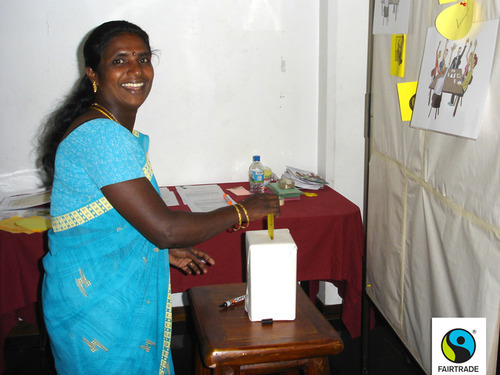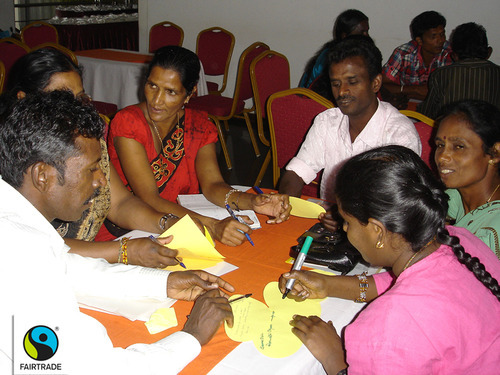
A worker from a Sri Lankan tea plantation takes part in Fairtrade’s Hired Labour Consultation.
June 11, Hatton, Sri Lanka
By Elisabeth Bystrom, Project Manager at Fairtrade International
What is a stronger symbol of Sri Lanka than tea? I have long associated Sri Lanka with delicious Ceylon growing on endless rolling, mist-covered hills. A romantic picture I admit and one that I was fortunate enough to see in person last year.
The picture gets better. Not only did I get to visit the country, but I was there to meet the people and talk with workers on tea plantations about their needs, their perceptions of progress, and how we could improve the Fairtrade Standard to make it better suited to their daily reality.
This was my first test taking the standard review ‘live’ to meet with workers and hear their views in an open setting and one of our first times engaging workers on such a scale with new materials and methodology. My partners included Sumedha Karunatillake and Felix Wijesinghe, two experienced Fairtrade field staff, as well as the NAPP programme manager Mariam Thomas.
On first impression, Sri Lanka was, well, WET!
From the time I arrived until the day I left, the rain never seemed to stop. Roads were like rivers, power lines were down, and I wondered how we would manage without electricity. But there is little need for electricity when people gather to talk and share views. Tea estate workers from all over the teardrop-shaped island arrived unfazed. There was no need for overhead projectors and power point presentations, everyone was there to be active and contribute.
We had an agenda to guide us through the day, but the beautiful thing about a participatory workshop is that no matter how you plan, conversations take their own course. Talk mainly circled around who should receive Fairtrade Premium; whether it should it be distributed to all workers or remain dedicated for community-based projects.

There seemed to be no shortage of opinions, and no hesitation to voice them, whether from a man or a woman, a tea plucker, a factory worker or a field supervisor. I was pleased to watch heated debates in small groups where workers argued for and against cash distribution of the Fairtrade Premium. Arguments were always well articulated, with examples of why or why not cash was a good idea. The overall feeling was that though community projects benefited the workers collectively, many felt the option to offer individual loans would also be a useful inclusion in the Standard.
The day sped by and before we knew it the sun had gone down. The rain made travel difficult, and several participants had to leave while the roads were still passable. This meant hurrying through the last part of the day. One of the most profound impressions that sticks with me was not so much about the workshop content, but the comments from participants who were happy to have the chance to meet with workers from neighboring plantations. They were grateful to have the opportunity to gather and share experiences and talk about their own lives, in particular what they have accomplished with the Fairtrade Premium and their plans for future projects.
While driving back down to Colombo through the curvy rolling hills covered in tea, the sun finally did come out. I was moved – not only by the beauty of the country – but by the openness of the people who did not hesitate to make me feel welcome and were more than willing to share their thoughts, hopes and dreams with me.
Elisabeth Bystrom is a Project Manager in Fairtrade International’s Standards Unit. She led the project of revising the Fairtrade Hired Labour Standard, a major undertaking involving consultations with over 400 workers and 18 workshops in 14 countries. The result is a new Standard that honours the day-to-day reality confronted by workers around the world. Read more about the final Hired Labour Standard here.


